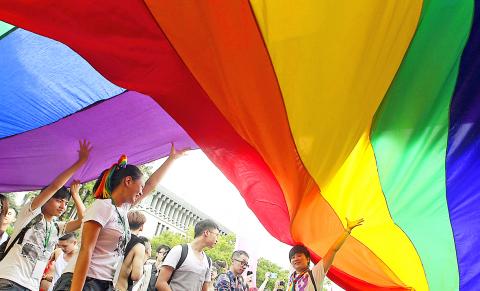Gay marriage advocates are calling for the central government to take steps to recognize same-sex relationships after the Taipei City Government on Wednesday became the second city in the nation to accept household registrations of same-sex partnerships.
Taipei’s move comes nearly one month after the Kaohsiung City Government began recognizing household registrations of same-sex partnerships.
Lu Hsin-chieh (呂欣潔), a candidate for the newly founded Social Democratic Party (Taiwan) in next year’s legislative election, called on the Legislative Yuan and the Ministry of Justice to recognize that with two local governments accepting registrations of same-sex partnerships, they are no longer taboo in Taiwanese society.

Photo: Reuters
The social activist added that a survey on changing attitudes toward homosexuality and same-sex marriage released by the Institute of Sociology of Academia Sinica last year indicates that Taiwanese society is ready to accept a same-sex marriage law.
While the local government registration is deemed in general as bearing more symbolic meaning than substantial benefits to same-sex couples, Lu suggested that the Taipei City Government include the household registration data in the National Health Insurance (NHI) data system, so that in the event of emergency surgery, a patient’s same-sex partner can sign a letter of consent.
She also proposed that the Taipei and Kaohsiung city governments set a precedent by entitling same-sex partners of their employees the rights and benefits of civil servant spouses.
Miao Bo-ya (苗博雅), another Social Democratic Party legislative candidate, said that despite household registration not being legally binding, same-sex partners can at least present it as proof of a close relationship in case of complicated legal disputes.
A lesbian herself, Miao said that she and her partner might register their relationship to judge the move’s effectiveness.

Tropical Storm Gaemi strengthened into a typhoon at 2pm yesterday, and could make landfall in Yilan County tomorrow, the Central Weather Administration (CWA) said yesterday. The agency was scheduled to issue a sea warning at 11:30pm yesterday, and could issue a land warning later today. Gaemi was moving north-northwest at 4kph, carrying maximum sustained winds near its center of up to 118.8kph and gusts of 154.8kph. The circumference is forecast to reach eastern Taiwan tomorrow morning, with the center making landfall in Yilan County later that night before departing from the north coast, CWA weather forecaster Kuan Shin-ping (官欣平) said yesterday. Uncertainty remains and

SEA WARNING LIKELY: The storm, named Gaemi, could become a moderate typhoon on Wednesday or Thursday, with the Taipei City Government preparing for flooding A tropical depression east of the Philippines developed into a tropical storm named Gaemi at 2pm yesterday, and was moving toward eastern Taiwan, the Central Weather Administration (CWA) said. Gaemi could begin to affect Taiwan proper on Tuesday, lasting until Friday, and could develop into a moderate typhoon on Wednesday or Thursday, it said. A sea warning for Gaemi could be issued as early as Tuesday morning, it added. Gaemi, the third tropical storm in the Pacific Ocean this typhoon season, is projected to begin moving northwest today, and be closest to Taiwan on Wednesday or Thursday, the agency said. Today, there would likely

DISRUPTIONS: The high-speed rail is to operate as normal, while several airlines either canceled flights or announced early departures or late arrivals Schools and offices in 15 cities and counties are to be closed today due to Typhoon Gaemi, local governments announced last night. The 15 are: Taipei, New Taipei City, Taoyuan, Tainan, Keelung, Hsinchu and Kaohsiung, as well as Yilan, Hualien, Hsinchu, Miaoli, Chiayi, Pingtung, Penghu and Lienchiang counties. People should brace for torrential rainfall brought by the storm, with its center forecast to make landfall on the east coast between tonight and tomorrow morning, the Central Weather Administration (CWA) said. The agency issued a sea warning for the typhoon at 11:30pm on Monday, followed by a land warning at 11:30am yesterday. As of

CASUALTY: A 70-year-old woman was killed by a falling tree in Kaohsiung as the premier warned all government agencies to remain on high alert for the next 24 hours Schools and offices nationwide are to be closed for a second day today as Typhoon Gaemi crosses over the nation, bringing torrential rain and whipping winds. Gaemi was forecast to make landfall late last night. From Tuesday night, its outer band brought substantial rainfall and strong winds to the nation. As of 6:15pm last night, the typhoon’s center was 20km southeast of Hualien County, Central Weather Administration (CWA) data showed. It was moving at 19kph and had a radius of 250km. As of 3pm yesterday, one woman had died, while 58 people were injured, the Central Emergency Operation Center said. The 70-year-old